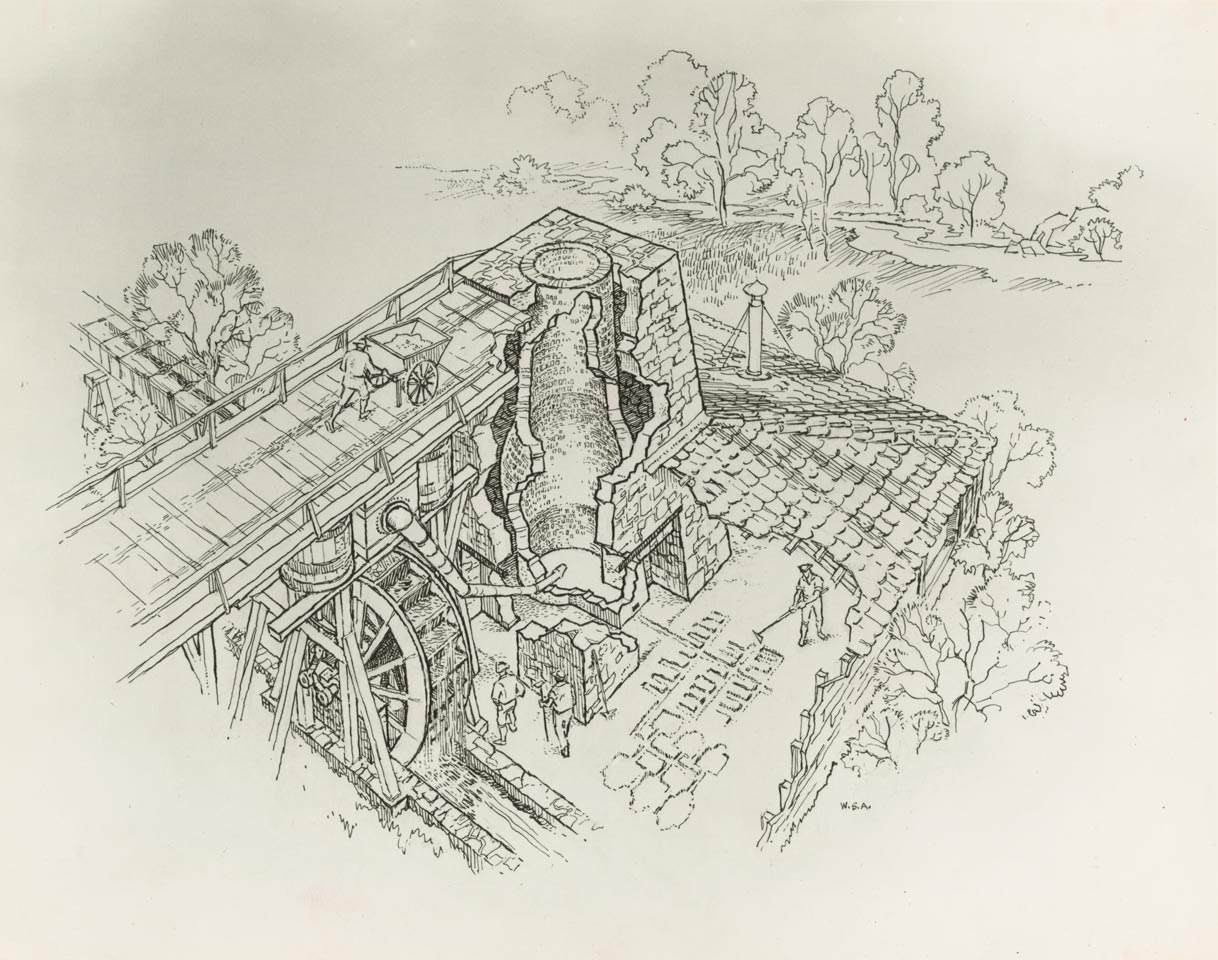In July 1814, entrepreneur William Weaver made a chance investment in the Virginia iron industry along with his new partner, Thomas Mayberry. Weaver and Mayberry purchased Union Forge (later renamed Buffalo Forge), located in Rockbridge County, and two blast furnaces, Etna Furnace and Retreat Furnace, in neighboring Botetourt County. Later, Weaver would become a prominent and successful ironmaster in Virginia and one of the largest slaveholders in Rockbridge County.
Initially, Weaver staffed his furnaces with a mixture of white laborers and hired slaves, but in October 1815 he purchased 11 slaves. Weaver would use this group of slaves, which included a valuable ironworker named Tooler, to form the basis of his large crew of skilled ironworkers.
In 1825, Weaver filed a chancery suit in the Augusta County courts to dissolve his partnership with Mayberry. It was a rather acrimonious dissolution, with contention over who owned the slaves purchased in 1815. In a cagey move, Weaver had the bill of sale for the slaves made out to himself, rather than to the partnership of Weaver & Mayberry, claiming that Mayberry was against slave ownership. While examining volumes found at the Augusta County Courthouse, I discovered nine volumes belonging to Weaver and his iron interests, which had been used as exhibits in the case.
The volumes cover a variety of topics and document the purchases Weaver and Mayberry made while establishing their iron interests in Virginia and record customer purchases of iron. But it is the details concerning the slaves living and working at Etna Furnace and Union Forge found throughout the records that make these volumes so unique. Weaver documented expenses paid for hiring slaves by listing their bond prices, recording the purchases of clothing and blankets for the slaves, and frequently mentioning payments made to “negroes for overwork.”
Slaves were compensated with their choice of either cash or goods from the ironmaster’s store for their “overwork.” To earn these funds slaves would perform such extra work as cording wood or working on Sunday or Christmas. They used their extra funds to purchase small luxury items such as sugar, coffee, tobacco, shoes, trousers, coats, cloth, or household items. Records included in the collection, such as the Etna Furnace Negro Book, illustrate the priorities of slaves and the choices they made with the funds they controlled themselves. This is a rare and invaluable glimpse into the private lives of slaves might not exist without such records.
The chancery cause, William Weaver vs. Thomas Mayberry, 1831, is part of the Augusta County Chancery Collection and is being prepared for digitization funded in part by a grant from the National Historical Publications and Records Commission (NHPRC); however, the volumes that comprise the William Weaver Business Records are open for research.
-Bari Helms, Local Records Archivist















A fascinating discovery. You write that the slaves were paid for overtime and that “They used their extra funds to purchase small luxury items such as sugar, coffee, tobacco, shoes, trousers, coats, cloth, or household items.” I would not characterize these as luxury items but as necessities. Supposedly the owner was responsible for providing adequate clothing for his slaves, and he didn’t. He passed that expense onto the slaves, knowing that they would use their “extra” time to obtain necessities. A marvelous system.
Henry Wiencek
Charlottesville
It is also interesting to note that while slaves amassed large sums of money via the “overwork” system, they were never permitted to purchase the one thing they most wanted, their freedom.
Not never. See The Road to Black Ned’s Forge: A Story of Race, Sex, and Trade on the Colonial American Frontier (Early American Histories) Jun 9, 2014, by Turk McCleskey.
In 1790, more than half the people of color in Virginia’s Hampshire and Hardy counties were free.
You have quite a bias. From a twenty-first century perspective, small luxury items may be considered necessities, but they probably were not so on the 18th-century frontier. What evidence do you have that owners did not provide for their slaves?
This case involves principles in an imptortant iron works in the Shenandoah Valley of Virginia, an iron works that is the subject of an extraordinarily fine book on industrial slavery, Charles B. Dew, Bond of
Iron: Master and Slave at Buffalo Forge (New York, 1994).
Brent Tarter
The Library of Virginia
This discussion caught my eye, as we live on the original farm, called”Soldiers Retreat” in the valley of the same name, located South of CliftonForge, VA,; near Glen Wilton and the coalmines/forge at Firmstone Manor, Longdale Furnace Road, Clifton Forge. The Dew family farm lies across the Cowpasture/ James Rivers from us. All these family references seem to connect with the information you mention, andis of great interest to me. Is the book “Bond of Iron” still in print?
Hello,
The paperback version of Bond of Iron is available through the major Internet booksellers and you may well find it in your local bookstore. The libraries in Buchanan and Fincastle have the book according to the RVL online catalog.
-Dale
I noted that one mine mentioned was named”Retreat”.
Incredible discovery! My ggg grandfather, Thomas Franklin “Frank” Foster, lived in Rockbridge, particularly in Buffalo and later South River, and was a part of a forge there, I think. I have no records other than what was mentioned on the Censuses following the War until the turn of the century. For very obvious reasons, he did not have any slaves on hand.
My husband’s gfather was Willoughby, brother of ThomsMaybury/Mayberry of Buffalo Forge. I am trying to find their final resting place. The first Thomas Mayberry is known as “The Ironmaster” as in “The Ironmaster Mayberrys” of PA. Check it out.
A new book which I wrote on the iron history of Alleghany, Augusta, Botetourt and Rockbridge counties: “A River of Iron” is available at Amazon.com